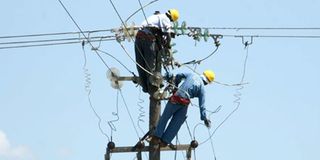Phasing out wooden power poles unwise

Kenya Power technicians at work. PHOTO | FILE | NATION MEDIA GROUP
What you need to know:
- The lifespan of a well-done concrete pole is 50 years, while that of a treated wooden pole is 40 years.
- The price of a concrete pole is between Sh18,000 and Sh20,000 against Sh10,000 and Sh12,000 for wooden poles.
Concrete poles become more expensive if you factor in the extra cost of specialised installation equipment.
In the US, wooden poles are still preferred over steel and concrete.
By end of this year, 50 per cent of all electricity transmission poles in Kenya will be made of concrete, that is, if Kenya Power meets its target set in 2011.
This was after the firm revised its policy on electricity poles.
In a move that has baffled stakeholders in the forestry and energy sectors, the firm will phase out wooden poles it has used since 1922 and turn to concrete poles for all new transmission lines, with wooden poles left for domestic connections only. It will also replace existing wooden poles with concrete poles.
Kenya Power says wooden poles have a shorter lifespan and are, therefore, more expensive over time.
FLAWED ARGUMENT
However, this argument is not only flawed, but also lacks any economic basis.
The lifespan of a well-done concrete pole is 50 years, while that of a treated wooden pole is 40 years.
But the price of a concrete pole is between Sh18,000 and Sh20,000 against Sh10,000 and Sh12,000 for wooden poles.
Concrete poles are, thus, 40 per cent more expensive. In addition, it is much more expensive to transport concrete poles as one weighs 1,000kg compared to 250kg for a wooden pole.
Concrete poles become more expensive if you factor in the extra cost of specialised installation equipment.
TREATED WOODEN POLE
Some wooden electricity poles erected in the country in 1954 are still in use today. A study by Engineering Data Management found that the assumed service life of a treated wooden pole greatly understates its actual life.
Barring a natural catastrophe, a wooden pole can last 75 years.
The power firm’s decision goes against the Kenya Energy Sector Environment and Social Responsibility Programme (KEEP) - a 10-year plan started in 2008 to provide quality but cheap power poles and promote commercial tree growing.
In 2008, the Ministry of Energy called on 2,000 commercial growers of eucalyptus to plant quality trees and save the country the high cost of imports from South Africa and Tanzania. Then Energy minister Kiraitu Murungi said the objective was to stop import by 2013.
He added: “The government’s fundamental duty is to create wealth, fight poverty and create jobs for youth. We should do everything possible to support commercial tree farmers.”
ENVIRONMENTAL IMPACT
The response was overwhelming, with growers committing 250,000 acres. Eucalyptus for power poles take seven to 10 years to mature. The ‘Buy Kenya Build Kenya’ policy has seen the number of treatment firms rise from seven in 2008 to 33 today.
As Dr Benson Kanyi, the executive director, Tree Biotechnology Programme Trust says the benefits of using wooden poles exceed financial gains.
Treated wood poles use less energy and resources, offset fossil fuel use and have a less environmental impact than concrete.
They also limit the accumulation of greenhouse gases. Without an assured market such as Kenya Power and the Rural Electrification Authority (REA), farmers will not invest in commercial tree growing.
Also the 10 per cent forest cover required under the Constitution will not be achieved.
SWAMPY AREAS
However, concrete poles are better to use in swampy areas or those prone to fires. Tanzania Electric Supply Company uses concrete poles in areas prone to bush fires and wet or swampy places.
In the US, wooden poles are still preferred over steel and concrete. There are 130 million wooden poles.
Uganda Electricity Transmission Company uses wooden and metal poles for high voltage transmissions. Australia, Britain, Norway, France, Germany, Canada and South Africa prefer wooden poles.
It is difficult to understand Kenya Power and REA want to phase out cheaper, superior and proven wooden poles that have carried power and communications to consumers for more than a century.
The real losers will be taxpayers, paying extra for an inferior product.
Mr Weya, a former Alego-Usonga MP, is the vice-chairman of Kenya Forest Growers [email protected]




